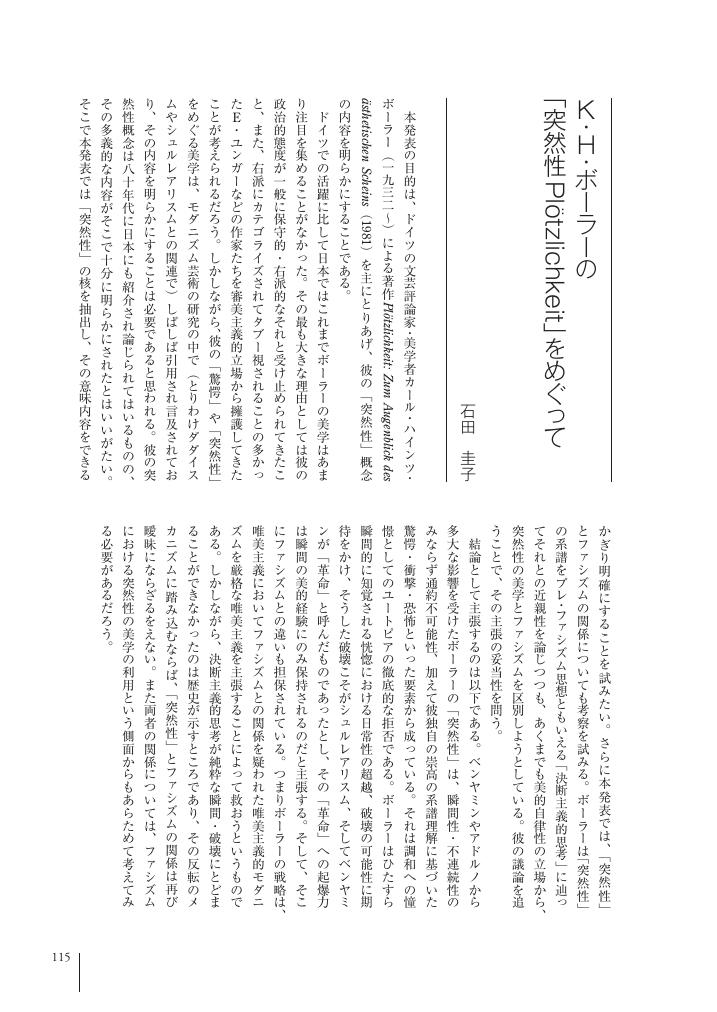- 著者
- 石田 圭子
- 出版者
- 美学会 ; 1950-
- 雑誌
- 美学 = Aesthetics (ISSN:05200962)
- 巻号頁・発行日
- vol.71, no.1, pp.49-60, 2020
3 0 0 0 OA アルベルト・シュペーアの「廃墟価値の理論」をめぐって
- 著者
- 石田 圭子
- 出版者
- 神戸大学大学院国際文化学研究科
- 雑誌
- 国際文化学研究 : 神戸大学大学院国際文化学研究科紀要 (ISSN:13405217)
- 巻号頁・発行日
- vol.50, pp.1*-29*, 2018-07 (Released:2018-08-21)
2 0 0 0 OA カール・ハインツ・ボーラーの「突然性(Plötzlichkeit)」をめぐって
- 著者
- 石田 圭子
- 出版者
- 美学会
- 雑誌
- 美学 (ISSN:05200962)
- 巻号頁・発行日
- vol.71, no.1, pp.49-60, 2020 (Released:2022-02-16)
The purpose of this paper is to consider the meaning of “suddenness (Plötzlichkeit)” proposed by K. H. Bohrer (1932-). First, I try to clarify the meaning of “suddenness” by elucidating the historical range of art that this notion can be applied to, the elements that consist of this idea, and the scope of its genealogy. Second, I examine the relationship between suddenness and fascist ideology, because Bohrer points out that one of the important sources of the concept is decisionism (Dezisionismus), the pre- fascistic thought. Yet, Bohrer tries to distinguish suddenness from such a pre-fascistic idea. “Suddenness” can be explained as an alternative to “appearance” or “semblance” (Schein), conveying a quality that has been understood as beauty. Nevertheless, he insists that suddenness is so momentary and subjective that it should be deprived of any metaphysical implication that appearance and semblance originally had, such as truth and Utopia. Bohrer says that art based on suddenness should be autonomous and can have no relations with any social and political context, for such context can never be possible without historical and continual time. Therefore, Bohrer’s strategy is to defend aestheticism by suggesting the rigid aestheticism based on suddenness.
2 0 0 0 IR 村山知義と〈春香伝〉 : 村山の演劇論との関連から
- 著者
- 石田 圭子
- 出版者
- 神戸大学大学院国際文化学研究科
- 雑誌
- 国際文化学研究 : 神戸大学大学院国際文化学研究科紀要 (ISSN:13405217)
- 巻号頁・発行日
- no.56, pp.1-23, 2021-07
- 著者
- 石田 圭子
- 出版者
- 東京芸術大学
- 雑誌
- 東京藝術大学美術学部論叢 (ISSN:18801048)
- 巻号頁・発行日
- vol.6, pp.5-20, 2010-02
1 0 0 0 OA K・H・ボーラーの 「突然性 Plötzlichkeit 」をめぐって
- 著者
- 石田 圭子
- 出版者
- 美学会
- 雑誌
- 美学 (ISSN:05200962)
- 巻号頁・発行日
- vol.70, no.2, pp.115, 2019 (Released:2021-05-08)
- 著者
- 石田 圭子
- 出版者
- 神戸大学大学院国際文化学研究科
- 雑誌
- 国際文化学研究 : 神戸大学大学院国際文化学研究科紀要 (ISSN:13405217)
- 巻号頁・発行日
- no.54, pp.1-14, 2020-09
- 著者
- 石田 圭子
- 出版者
- 美学会
- 雑誌
- 美学 (ISSN:05200962)
- 巻号頁・発行日
- vol.61, no.2, pp.115, 2010-12-31 (Released:2017-05-22)
1 0 0 0 OA T・E・ヒュームの芸術論と原(プロト)ファシズム・イデオロギー
- 著者
- 石田 圭子
- 出版者
- 美学会
- 雑誌
- 美学 (ISSN:05200962)
- 巻号頁・発行日
- vol.59, no.2, pp.2-15, 2008-12-31 (Released:2017-05-22)
T. E. Hulme, an aesthetician and a critic, is famous for his contribution to Imagism, one of the most important movements of Anglo-American Modernism. This leading figure of Modernism is also notorious as a sympathizer of protofascism who celebrates Charles Maurras and Georges Sorel. In this paper, I try to analyze the relation between Hulme's aesthetics and the ideology of protofascism. In his essays, rejecting the sensibility of Romanticism, Hulme insists on the superiority of Classicism, which is, actually, deeply affected by the political and literary view of Maurras who regards Classicism as 'anti' to liberalism and democracy. Moreover his keen interest in geometric-abstract art reflects his worldview - reactionary modernism whose core is 'the religious attitude'. In this view, he supports Sorel's political theory in which he finds Classicism and the religious attitude. Finally I point out the homogeneity between Hulme's idea and protofascistic Weltanschauung by taking an overview on the rise of irrationalism and the vulgarized Lebensphilosophie. This close relationship between aesthetics and protofascism in Hulme's thought suggests that Modernism and fascism, the two concepts that are widely assumed to be antithetical, might partly have an profound kinship.
- 著者
- 石田 圭子
- 出版者
- 美学会
- 雑誌
- 美学 (ISSN:05200962)
- 巻号頁・発行日
- vol.58, no.3, pp.134, 2007-12-31 (Released:2017-05-22)
1 0 0 0 OA T・E・ヒュームの芸術論と原(プロト)ファシズム・イデオロギー
- 著者
- 石田 圭子
- 出版者
- 美学会
- 雑誌
- 美學 (ISSN:05200962)
- 巻号頁・発行日
- vol.59, no.2, pp.2-15, 2008-12-31
T. E. Hulme, an aesthetician and a critic, is famous for his contribution to Imagism, one of the most important movements of Anglo-American Modernism. This leading figure of Modernism is also notorious as a sympathizer of protofascism who celebrates Charles Maurras and Georges Sorel. In this paper, I try to analyze the relation between Hulme's aesthetics and the ideology of protofascism. In his essays, rejecting the sensibility of Romanticism, Hulme insists on the superiority of Classicism, which is, actually, deeply affected by the political and literary view of Maurras who regards Classicism as 'anti' to liberalism and democracy. Moreover his keen interest in geometric-abstract art reflects his worldview - reactionary modernism whose core is 'the religious attitude'. In this view, he supports Sorel's political theory in which he finds Classicism and the religious attitude. Finally I point out the homogeneity between Hulme's idea and protofascistic Weltanschauung by taking an overview on the rise of irrationalism and the vulgarized Lebensphilosophie. This close relationship between aesthetics and protofascism in Hulme's thought suggests that Modernism and fascism, the two concepts that are widely assumed to be antithetical, might partly have an profound kinship.



